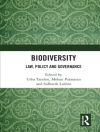- Provides a comprehensive overview of the wealth of research on analysing, understanding and optimising the nutraceutical properties of fruit and vegetables, focussing primarily on phytochemicals/phytochemical compounds
- Reviews the current research on mechanisms of action and the potential role of key phytochemical compounds, such as antioxidants and flavonoids, in preventing the onset of chronic diseases
- Explores current advances in understanding and improving the nutraceutical properties of key horticultural crops, including apples, cranberries, broccoli and other brassicas
Jadual kandungan
Part 1 Phytochemical compounds in fruits and vegetables: polyphenols
1.Advances in understanding the nutraceutical properties of antioxidants in fruits and vegetables: Ugunujhie Agbaje, Mallaidh Hyndman and Soraeya Kharaty, School of Food Science and Environmental Health, Technological University Dublin – City Campus, Ireland; and Swarna Jaiswal and Amit K. Jaiswal, School of Food Science and Environmental Health, Technological University Dublin – City Campus and Environmental Sustainability and Health Institute, Technological University Dublin – City Campus, Ireland;
2.Advances in understanding the nutraceutical properties of phenolic compounds in fruits and vegetables: Cristine Vanz Borges, São Paulo State University (UNESP), Brazil; Fabio Vianello, University of Padua (UNIPD), Italy; Ricardo Alfredo Kluge, University of São Paulo (USP), Brazil; and Giuseppina Pace Pereira Lima, São Paulo State University (UNESP), Brazil;
3.Understanding the nutraceutical properties of flavonoids in fruits and vegetables: chemical structure and groups: A. D. Diwan, S. N. Harke and A. N. Panche, MGM Institute of Biosciences & Technology, Mahatma Gandhi Mission University, India;
4.Understanding the nutraceutical properties of flavonoids in fruits and vegetables: mechanisms of action: A. D. Diwan, S. N. Harke and A. N. Panche, MGM Institute of Biosciences & Technology, Mahatma Gandhi Mission University, India;
Part 2 Phytochemicals in fruits and vegetables: glucosinolates and organosulfur compounds
5.Health-promoting effects of glucosinolates and their breakdown products: Ella O’Grady, Greta Pileckaite, Almha Gilheany and Endrita Kucana, School of Food Science and Environmental Health, Technological University Dublin – City Campus, Ireland; and Swarna Jaiswal and Amit K. Jaiswal, School of Food Science and Environmental Health, Technological University Dublin – City Campus and Environmental Sustainability and Health Institute, Technological University Dublin – City Campus, Ireland;
6.Nutraceutical potential of glucosinolates: Ella O’Grady and Greta Pileckaite, School of Food Science and Environmental Health, Technological University Dublin – City Campus, Ireland; Aline Alberti, Graduate Program in Food Science and Technology, State University of Ponta Grossa, Brazil; and Swarna Jaiswal and Amit K. Jaiswal, School of Food Science and Environmental Health, Technological University Dublin – City Campus and Environmental Sustainability and Health Institute, Technological University Dublin – City Campus, Ireland;
7.Understanding the health benefits and nutraceutical properties of organosulphur compounds in vegetables: Greta Pileckaite and Ella O’Grady, School of Food Science and Environmental Health, Technological University Dublin – City Campus, Ireland; and Swarna Jaiswal and Amit K. Jaiswal, School of Food Science and Environmental Health, Technological University Dublin – City Campus and Environmental Sustainability and Health Institute, Technological University Dublin – City Campus, Ireland;
Part 3 Phytochemicals and the prevention of disease
8.Advances in understanding the role of plant phytochemicals in preventing cancer: Gulsun Akdemir Evrendilek, Bolu Abant Izzet Baysal University, Turkey;
9.Advances in understanding the role of plant phytochemicals in preventing cardiovascular disease: Nicholas J. Sadgrove and Monique S. J. Simmonds, Royal Botanic Gardens – Kew, UK;
Part 4 Analysing and optimising phytochemical compounds in fruits and vegetables
10.Advances in screening/analysis of phytochemical compounds in fruits and vegetables: Alessandro Nogueira, State University of Ponta Grossa, Brazil; Amit K. Jaiswal, School of Food Science and Environmental Health, Technological University Dublin – City Campus and Environmental Sustainability and Health Institute, Technological University Dublin – City Campus, Ireland; and Aline Alberti, State University of Ponta Grossa, Brazil;
11.Agronomic factors affecting phytochemical compounds in fruits and vegetables: Jiangtao Hu, Li Zhang, Zheng Wang, Jie Peng, Xiao Yang and Qichang Yang, Institute of Urban Agriculture, Chinese Academy of Agricultural Sciences, Chengdu National Agricultural Science and Technology Center, China;
12.Understanding processing of phytochemical compounds in fruits and vegetables in the gut: Stan Kubow, Lucas Roldos, Kailee Wark and Michèle M. Iskandar, Mc Gill University, Canada;
13.Advances in understanding and improving the nutraceutical properties of cranberries: Oliver Chen, Biofortis Research, Merieux Nutri Sciences and Tufts University, USA; and Eunice Mah, Biofortis Research, Merieux Nutri Sciences, USA;
1Advances in understanding and improving the nutraceutical properties of apples: Lia Noemi Gerschenson, Eliana Noemi Fissore and Carolina Bélen Gómez Vargas, Universidad de Buenos Aires and CONICET, Argentina;
15.Advances in understanding and improving the nutraceutical properties of broccoli and other Brassicas: Elsa M. Gonçalves, Unidade de Tecnologia e Inovação, Instituto Nacional de Investigação Agrária e Veterinária and Geo Bio Tec – Geobiociências, Geoengenharias e Geotecnologias, Faculdade de Ciências e Tecnologia, Universidade Nova de Lisboa, Portugal; Carla Alegria, SFCOLAB – Associação Smart Farm COLAB Laboratório Colaborativo para a Inovação Digital na Agricultura, Rua Cândido dos Reis nº1, Espaço SFCOLAB and c E3c – Centre for Ecology, Evolution and Environmental Changes, Faculdade de Ciências, Universidade de Lisboa, Portugal; Ana Cristina Ramos, Unidade de Tecnologia e Inovação, Instituto Nacional de Investigação Agrária e Veterinária and Geo Bio Tec – Geobiociências, Geoengenharias e Geotecnologias, Faculdade de Ciências e Tecnologia, Universidade Nova de Lisboa, Portugal; and Marta Abreu, Unidade de Tecnologia e Inovação, Instituto Nacional de Investigação Agrária e Veterinária and LEAF, Linking Landscape, Environment, Agriculture and Food, School of Agriculture, Universidade de Lisboa, Portugal;
Mengenai Pengarang
Dr. Elsa M. Gonçalves is a Researcher at the Instituto Nacional de Investigação Agrária e Veterinária, Portugal. She is responsible for the Sensory Testing Laboratories, implementing a range of sensory analysis techniques, to evaluate different food products and applied statistical analysis, allowing products to be grouped, and their similarities and differences quantified. She is a member of the Competence Centre of the Mediterranean diet. She has been the national delegate of the Codex Committee on Methods of Analysis and Sampling (CCMAS) since 2019.












